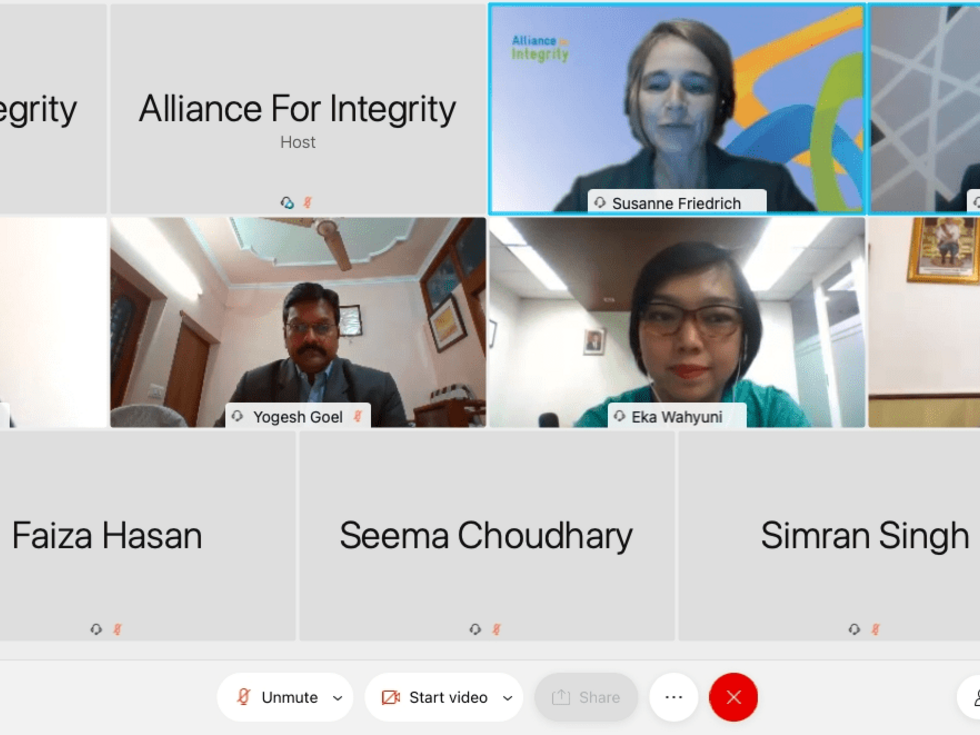Changing Legal Regimes in Anti-Corruption in Asia
08.12.2020
Asia, online

To mark the International Anti-Corruption Day, the Alliance for Integrity, in cooperation with Transparency International Cambodia, organised an international panel discussion focusing on changing legal regimes in anti-corruption. The event put emphasis on Malaysia, Cambodia, Indonesia and India. The four countries have great economic potential but face the common challenge of corruption in business. The panel continued the public discussion on the fact that transparency laws are becoming stricter and what implications this has for the private sector, especially for small and medium-sized enterprises (SMEs). The event was moderated by Ms. Eka Wahyuni, Advocacy & Project Manager of Eurocham Indonesia.
Opening the panel discussion, Mr. Pisey Pech, Executive Director of Transparency International Cambodia, provided an overview of the key challenges Cambodia is currently facing and pointed out the potentials arising from them. The country ratified the United Nations Convention against Corruption in 2007 and adopted the National Anti-Corruption Law in 2010. In his presentation, he highlighted the work of the Anti-Corruption Council and the Anti-Corruption Unit (ACU), which focuses on disseminating information to the public and relevant stakeholders, law enforcement and the prevention of corruption. “The National Integrity Assessment found that Cambodia has effective mechanisms in place to prevent corruption. However, the enforcement gap is huge. Due to poor implementation structures, the legal framework has suffered,” he stated. With a view to the Corruption Perceptions Index 2020 of Transparency International, Cambodia is ranked 160 among 180 countries and territories. From a regional perspective, the country continues to occupy the third lowest spot in the Asian Pacific region.
In contrast, India ranked 86th in this year's Corruption Perceptions Index. Mr. Yogesh Goel, Head of Ethics & Compliance at Infosys India, explained the historical background that led to the development of India's regulatory framework. In 1991, the country opened up to international market players. Information technology became instrumental in driving the process of economic growth. As part of the discussion, he elaborated on the anti-bribery and anti-corruption laws in India. The Prevention of Corruption Act prohibits bribery of public servants; however, the Act does not regulate bribery in the private sector. Facilitation payments are also considered bribes under the Prevention of Corruption Act. The Fugitive Economic Offenders Act, 2018 provides for the confiscation of the property of persons who evade orders relating to economic offences. The Whistleblowers Protection Act, 2011 is designed to achieve similar objectives.
Following, Mr. Mohd. Yany bin Yusoff, Senior Consultant at the Malaysian Institute of Integrity, shed focus on Malaysia. In his presentation, he explained the National Anti-Corruption Plan, 2019-2023. The objective of the legal framework is to ensure accountability and credibility of judiciary, prosecution and law enforcement agencies in order to guarantee efficient and responsive public service delivery and integrity in business. “The no gift policy does not work, especially in the private sector, as the basis for a thriving business is networking and building strong relationships. Therefore, it is necessary to regulate the gift culture by introducing policies such as accepting gifts only in kind,” he stated. In addition, affiliates of a company must disclose their liabilities in order to effectively fight corruption.
Concluding the panel discussion, Mr. Gandjar Laksmana Bonaprapta, Lecturer in Criminal Law at the University of Indonesia, outlined a brief chronicle of the development of the bribery law in Indonesia. The Crime of Bribery Law came into force in 1980. Subsequently, Indonesia formalised the anti-corruption law and in 2016 recognised the Regulation on Criminal Liability of Corporations, which was issued by the Supreme Court. The regulation was a turning point in the fight against corruption, as companies are now required to establish internal corruption prevention measures.
The panel discussion also addressed the challenges SMEs face during the pandemic and how they can adapt to the changing legal requirements. To comply with national anti-corruption laws, the experts recommended to implement a Code of Ethics and to use compliance management tools, such as TheIntegrityApp. The app helps SMEs to self-evaluate their compliance measures and to compare it with international standards. After the self-assessment, each company receives tailored access to resources such as podcasts, online seminars, publications and more, all designed to improve the company's integrity standards. By implementing a strong compliance management system, businesses can empower their employees to establish a culture of integrity.
Intra-regional exchange helps to share experiences, lessons learnt and best practices between countries aiming to jointly develop effective approaches to complex problems. Further exchanges of this kind are already being planned and will be announced on the Alliance for Integrity’s website.
Authors: Seema Cloudhary & Simran Singh





